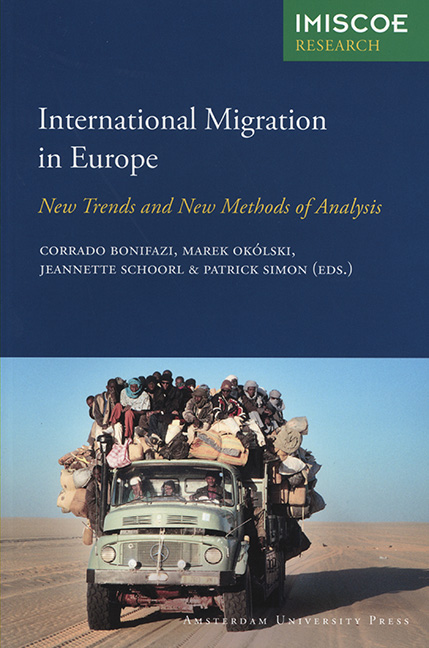Book contents
- Frontmatter
- Contents
- Preface
- 1 Introduction
- PART I NEW FORMS OF MIGRATION IN EUROPE
- PART II EVOLUTION OF REGIONAL PATTERNS OF INTERNATIONAL MIGRATION IN EUROPE
- PART III MEASURING INTEGRATION: IMMIGRANTS AND THE SECOND GENERATION
- PART IV SPECIAL SURVEYS IN INTERNATIONAL MIGRATION STUDIES
- List of Contributors
- Index
- Other IMISCOE Titles
14 - Design of Samples For International Migration Surveys: Methodological Considerations and Lessons Learned From A Multi-Country Study in Africa and Europe
Published online by Cambridge University Press: 22 June 2021
- Frontmatter
- Contents
- Preface
- 1 Introduction
- PART I NEW FORMS OF MIGRATION IN EUROPE
- PART II EVOLUTION OF REGIONAL PATTERNS OF INTERNATIONAL MIGRATION IN EUROPE
- PART III MEASURING INTEGRATION: IMMIGRANTS AND THE SECOND GENERATION
- PART IV SPECIAL SURVEYS IN INTERNATIONAL MIGRATION STUDIES
- List of Contributors
- Index
- Other IMISCOE Titles
Summary
Introduction
Worldwide, international migration is attracting increased attention, which is manifested in the rapidly growing literature in migration and other social science journals, in increasingly restrictive immigration policies in most receiving countries, and in a rising interest in the role of international migration in economic development of developing nations. The growing importance of international migration is evident in the data and in contemporary policies on international migration (UN 1998; Castles & Miller 1998; UN 2000; UN 2004). Thus, the total number of international migrants in the world was estimated as 191 million in 2005, including 115 million in developed countries (many in an unauthorised state), compared to 75 million in 1960 and 155 million in 1990 (UN 2006). The number of countries wishing to change their international migration rose from seven in 1976 to nineteen by 1986 and thirty-five in 2003, most of these wishing to restrict it (UN 2004).
In recent decades, migration flows to the EU have increased in magnitude and complexity. The proportion of the world's population of international migrants living in the EU doubled from 3 to 6 per cent between 1960 and 2000, even excluding the effects of border changes since 1990. Migration within the EU has also become a major policy issue, requiring better insight about migration processes, including migration stocks and flows (European Commission 1996; Coppel 2001; IOM 2003). Unfortunately, both data and studies on the determinants or consequences of international migration are deficient as existing data sources do not collect the type and detail of information required to study migration processes.
However, it is possible for specialised migration surveys to provide the needed data provided that adequate sampling procedures and questionnaires are used, that surveys are carried out in both sending and receiving countries, and that, ideally, surveys are linked. In this chapter we illustrate this by describing the design and application of specialised sampling procedures in a multi-country study of migration to EU countries from West Africa and the Mediterranean region. The study was funded by the Commission of European Communities (‘the European Commission’), executed by Eurostat and the Netherlands Interdisciplinary Demographic Institute (NIDI), and implemented by national research institutes. Data were collected in 1996-1997.
- Type
- Chapter
- Information
- International Migration in EuropeNew Trends and New Methods of Analysis, pp. 293 - 312Publisher: Amsterdam University PressPrint publication year: 2008
- 2
- Cited by



